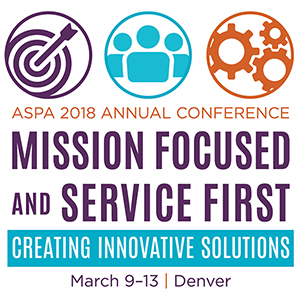2018 Conference Track Topics

ASPA’s 2018 Annual Conference will center around the theme:
Mission Focused and Service First: Creating Innovative Solutions. Presentation tracks will look to definitively bridge theory with practice, providing opportunities not only for researchers and academicians to demonstrate their work, but also highlight ways practitioners can put that work to use—and have already done so. Far from being theoretical, attendees can expect to attend this year’s conference and take home hands-on innovations they can put to use in their locality.
Ten tracks will categorize this year’s panels and workshops across the dominant themes within the discipline.
Integral to all of them, however, will be the concepts of innovation, evidence based decisionmaking and taking theory to practice.
The conference co-chairs encourage all who submit papers for consideration to make sure they are considering those concepts as they prepare their proposals.
Tracks
1. On a Shoestring: Budget, Finance and Procurement
Public budgeting is a process oriented activity incorporating a wide range of decisional premises. Much like policymaking, budgeting is defining social and political needs and then translating those needs into economic action. However, the consistency of the public remaining the same on every policy matter is nearly impossible. It is also inevitable that tax revenue and public expenditures operate on different cycles and may leave the government in debt or a deficit from time to time. What does the research tell us and how are on-the-ground administrators putting their experiences to use for best practices?
Sample Topical Areas Include:
- Performance-informed budgeting and reporting
- Acquisition, contracts, procurement and grants
- Public debt
- Retirement systems
- Fiscal stress and resource deficiencies
- Financial transparency
- Financing economic development
- Public performance standards and benchmarking
- Privatization and collaborations
2. Before (and After) the Storm: Emergency and Disaster Management
Successful recovery from a disaster requires coordination with various federal, state and local frameworks, as well as intense coordination between sectors and stakeholders at the community level. Emergency managers have an opportunity to use the post-disaster policy window to create a more resilient community, but more often than not, disaster recovery leads to unequal outcomes and exacerbates the vulnerability of those most at risk. Planning for recovery prior to an event—including institutionalizing the mechanisms and frameworks needed for effective coordination with the National Disaster Recovery Framework—is crucial to ensuring a successful recovery process. What new data can we bring to bear within disaster management and what can we learn from emergency managers who have lived through the storm?
Sample Topical Areas Include:
- Strategic crisis management
- Homeland security
- Implementation challenges
- Local, state and federal agency collaboration
- Advancing public safety and trust
- Border security
- Co-production
- Economic consequences
3. An Eye Toward the Future: Environment and Technology
Concern over environmental issues such as air pollution, water quality and natural resource management—just to name a few—continue to permeate discussions at all levels of government. As these concerns grow, it is evident that questions surrounding how to best manage environmental resources and potential harm to them have implications at the local, state and federal level. These concerns not only impact the environment but also have economic and social implications to which we must be attentive. What's a public administrator to do?
Sample Topical Areas Include:
- Natural resource management
- Environmental policy
- Transportation
- Smart growth and livable communities
- Sustainability and economic development
- Technology breakthroughs and emerging trends
- Health and medicine
- Social media
- Cyber security
- Big data
4. A Guiding Philosophy: Ethics and the Law
Sample Topical Areas:
- Combating corruption
- Standards of accountability
- Competing values
- Ethical frameworks
- Legal challenges
- Integrity in government
- Professionalism in the industry
- Police and community relations
- Education issues
5. Diamonds in the Rough: Human Resource Management
Sample Topical Areas:
- Innovative HR strategies
- Engaging employees
- Cultivating leadership
- Employee satisfaction and motivation
- Labor relations
- Improving productivity and efficiency
- Diversity in the workplace
- Public pensions and retirement
6. Blurring the Lines: International and Comparative Public Administration
Sample Topical Areas:
- Global public administration
- Federalism and intergovernmental relations
- Collaboration across public administration organizations
- Models of collaborative governance
- Sustainable governance in nations around the world
- Infrastructure and megaprojects
7. Winning the War: The Military in Public Administration
Sample Topical Areas:
- Cultures of service
- Chains of command
- Transfer of these services to the civilian and government leadership roles
- Critical issues facing veterans and military families
- Bridging the gap between military and society
- Military and public service motivation
- Infrastructure on base
- Procurement
- Veteran’s affairs
- Military academies
8. A Fresh Approach: Nonprofits and Civic Engagement
Sample Topical Areas:
- Nonprofit and nongovernmental organization collaboration
- Volunteerism
- Civic engagement & public service motivation
- Community visioning
- Capacity building
- Open source government
- Role of nonprofits in shaping policy
9. All Are Not Equal: Advancing Social Equity
Sample Topical Areas:
- Public services in at-risk communities
- Immigration practices and implications
- Race and ethnicity
- Gender equality
- LGBTQIA
- Tribal issues
- Youth and the elderly
- Cultural issues
- Education issues
10. A Perfect World: Public Administration Theory
Sample Topical Areas:
- Evaluation and contribution of practice-based evidence
- Theoretical concepts and approaches to public administration
- Governance and theory
- Novel techniques and cutting-edge research
- Practitioner contributions to research and teaching
- Academic contributions to public management and policy